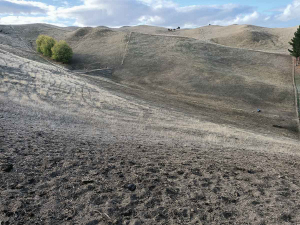Government Declares Medium-Scale Adverse Weather Event in Bay of Plenty, Gisborne/Tairāwhiti, and Canterbury
Recent weather events in the Bay of Plenty, Gisborne/Tairawhiti, and Canterbury have been declared a medium-scale adverse event.
 In the past few weeks, the rain has come to Hawkes Bay and paddocks are greening up the brown landscape like it was in the region when this photo was taken back in June.
In the past few weeks, the rain has come to Hawkes Bay and paddocks are greening up the brown landscape like it was in the region when this photo was taken back in June.
The unknown of what winter will bring is very much on the mind of the Hawkes Bay Rural Support Trust head Mike Barham.
He told Rural News that if the weather remains kind, most farmers will be okay. Barham says people are handling the situation quite well and the mild weather currently being experienced has been the saviour. A large amount of feed for animals has been donated to the Trust and more is on the way.
Barham says farmers have also been very proactive in getting feed in and many are now about to start lambing.
“We have not had get a get out of jail situation like this for many years and the good weather has been a life-line time for farmers.”
He says what will help the situation is that most farms are only about 70% stocked, which will effectively create a much easier spring because of the lower stocking rate. Barham says the equation is quite simple – bring feed in or take stock out.
“Over the years, Hawkes Bay farmers have become better educated and developed a much better way of handling droughts. This year has been a biggie and it has generally caught people out. One thing that will save them is that they have a bigger component of trading stock and less capital stock than they used to. So, when there is no rain, there are certain triggers they can pull and one of those is reducing stock,” he says.
On the issue of the mental state of farmers in Hawkes Bay, Barham says with things like droughts, issues are always going to arise. He says while they are helping out a number of people, the numbers are no greater than one would expect for an event like this.
“There will always be a few who don’t handle these situations well. On the other hand, some have handled it really well,” he says.
Welcome rains
In the past few weeks, the rain has come to Hawkes Bay and paddocks are greening up, according to the head of the region’s Rural Advisory Group, Lochie MacGillivray.
He says on some farms, conditions have become treacherous because of the mud caused by the lack of substantial pasture growth.
Like Mike Barham, MacGillivray says the continuation of good weather holds the key as to how the region will fare though winter. He says with soil temperatures still good, pasture covers are rapidly improving – which is fantastic.
“There are a number of farmers who are going to manage through okay. But we have got a bit of tail end that are struggling and, to be fair, they have been behind the eight ball for some time now,” he told Rural News. “What I am seeing is that people are tired and emotionally exhausted after months of feeding out and doing their best to look after their animals.”
MacGillivray says the last thing these people want is more advice from experts.
“What they probably want is for someone to take over feeding out for a while.”
OPINION: "We are back to where we were a year ago," according to a leading banking analyst in the UK, referring to US president Donald Trump's latest imposition of a global 10% tariff on all exports into the US.
DairyNZ says the Government’s proposed Resource Management Act reform needs further work to ensure it delivers on its intent.
Overseas Trade Minister Todd McClay says he's working constructively with the Labour Party in the hope they will endorse the free trade agreement (FTA) with India when the agreement comes before Parliament for ratification.
Donald Trump's latest tariff tantrum has again thrown the world of trade into a new round of turmoil and uncertainty, and NZ is caught up in it.
The third edition of the NZ Dairy Expo, held in mid-February in Matamata, has shown that the KISS principle (keep it simple stupid) was getting a positive response from exhibitors and visitors alike.
Twenty years ago, South African dairy farm manager Louis Vandenberg was sent to a farm in Waikato to provide training on Afimilk technology.